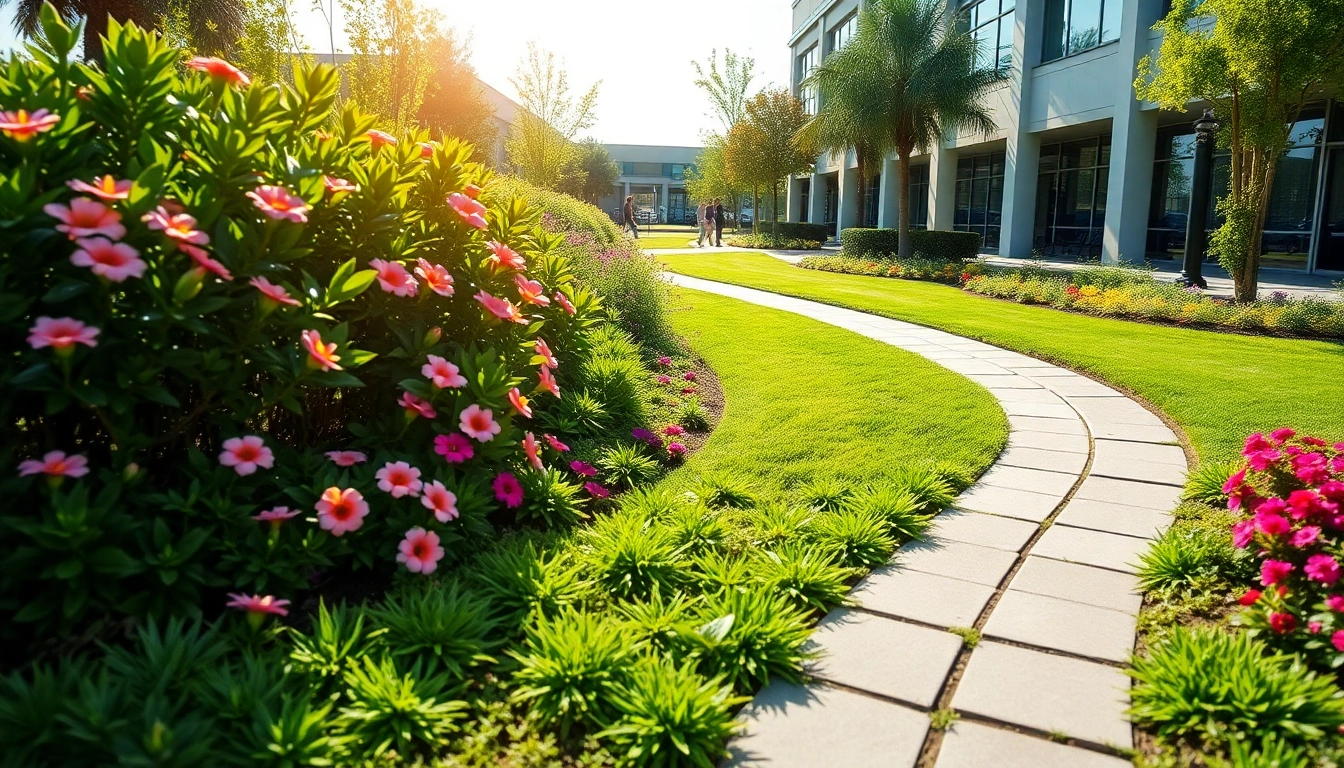Understanding the Role of Commercial Landscaping Contractors
Definition and Services of Contractors
Commercial landscaping contractors play a pivotal role in the development and maintenance of outdoor spaces that serve commercial properties. Unlike residential landscapers who primarily focus on private homes and small gardens, commercial contractors are equipped to handle larger, more complex projects dedicated to businesses, parks, and public spaces. Their suite of services typically includes landscape design, installation, maintenance, and management of various outdoor elements such as plants, hardscapes, irrigation systems, and lighting. These contractors often collaborate with architects and property managers to align with a broader vision, ensuring that the outdoor environment contributes aesthetically and functionally to the commercial objectives of the property.
Why Commercial Landscaping Matters
Investing in professional landscaping is crucial for businesses seeking to enhance their curb appeal, provide outdoor spaces for clients and employees, and create a favorable environment that reflects their brand values. A well-maintained landscape can lead to increased property value, attract customers, and improve overall satisfaction among employees by creating inviting spaces for relaxation and collaboration. Moreover, well-designed landscapes can be energy efficient by providing natural shading and reducing heating and cooling costs. Many companies now recognize that their outdoor spaces are extensions of their brand, making it essential to engage commercial landscaping contractors who can deliver designs that resonate with their goals.
Current Trends in Landscaping Design
The field of landscaping is continually evolving, with new trends emerging to meet the changing demands of the market and the environment. Some current trends include sustainable landscaping practices that prioritize native plants and eco-friendly materials, reducing the water and energy consumption of landscapes. Another trend is the integration of outdoor living spaces, which allow for more communal use of outdoor areas—including patios, outdoor kitchens, and recreational spaces—to foster social interactions among employees and customers. Additionally, technology is increasingly being employed in landscaping, from automated irrigation systems to landscape maintenance apps, improving efficiency and results in both installation and upkeep.
Choosing the Right Commercial Landscaping Contractor
Key Qualities to Look For
Selecting the right commercial landscaping contractor can significantly affect the success of your landscaping project. There are several key qualities to consider: first, ensure that the contractor has a robust portfolio demonstrating a variety of completed projects that align with your vision. Look for contractors who have positive client testimonials, which speak to their reliability, communication skills, and ability to meet deadlines. Furthermore, their knowledge of local flora, as well as environmental practices and regulations, is critical in creating sustainable landscapes. Lastly, ensure they are licensed, insured, and bonded to protect your investment throughout the project.
Comparing Quotes and Services
Once you’ve shortlisted potential contractors, comparing quotes can be daunting. It’s essential to obtain detailed and itemized quotes to understand what each contractor offers. Look beyond just the bottom line; consider what services are included. Some contractors may offer maintenance packages, while others might charge separately for ongoing care. Analyze if they’ve factored in durability, quality of materials, and labor costs. Remember that the cheapest quote may not always reflect the best value if it compromises quality or service.
Importance of Local Knowledge
Local knowledge is an invaluable asset when it comes to commercial landscaping. Contractors familiar with the regional climate, soil types, and native plant species can recommend designs that not only thrive but also require less maintenance and water. Such knowledge can also help navigate local regulations or zoning laws affecting landscaping projects, ensuring compliance and eliminating the risk of costly modifications down the line. Engaging a contractor who understands your local environment maximizes the potential for a sustainable and aesthetically pleasing design.
Best Practices for Project Management
Effective Communication with Clients
Clear and effective communication is paramount in any business arrangement, and landscaping contracts are no exception. Establishing open channels of communication from the initial consultation through completion helps ensure that client expectations align with project outcomes. Regular updates on progress, challenges, and milestones can foster trust and provide opportunities for feedback. It’s also essential to clarify the methods of communication preferred by both parties, whether through in-person meetings, emails, or project management tools.
Scheduling and Time Management Tips
Proper scheduling is critical to the success of landscaping projects, which can be affected by various factors such as weather conditions or supply chain issues. Establish realistic timelines and adhere to them as closely as possible. Using project management tools can aid in tracking progress and deadlines while helping to allocate resources effectively. When setting schedules, incorporate buffer periods to accommodate unforeseen events, allowing for a more flexible approach and reducing project delays.
Using Technology for Project Tracking
Adopting technological solutions can greatly enhance project management for landscaping contractors. Software and applications designed for landscaping can facilitate tasks such as scheduling, budgeting, and progress tracking. Utilizing GPS technology for tracking equipment and employee locations can optimize labor efficiency and resource use. Moreover, employing drones for site surveying and design visualization can provide valuable insights into project feasibility and design planning, aiding in presenting ideas to clients in a visually compelling manner.
Common Challenges Faced by Commercial Landscaping Contractors
Addressing Budget Constraints
Budget constraints are a recurring challenge faced by commercial landscaping contractors. Proper initial budgeting and clear client communication about costs are essential to avoid potential pitfalls later in the project. Encourage clients to prioritize elements of the project to accommodate their budget—sometimes scaling back certain aspects may provide adequate functionality while saving costs. Consider sourcing materials locally or using alternative solutions which can also yield substantial savings for both project costs and transportation.
Dealing with Environmental Regulations
Compliance with environmental regulations is a significant aspect of commercial landscaping. Many areas have specific regulations regarding land use, water management, and pesticide application. Contractors must stay informed about local laws and guidelines and ensure that their projects adhere to these standards. Building relationships with local regulatory agencies can also facilitate smoother project execution and provide resources for information and compliance strategies.
Managing Seasonal Variations in Workload
Seasonal variations can pose logistical challenges, causing fluctuations in workloads. Developing a versatile team that can shift focus to various project types can help balance workloads throughout the year. For example, during peak planting seasons, you may focus on installation projects, whereas slower months can be used for maintenance and prep work for the upcoming season. Diversifying service offerings, such as snow removal in winter, can also help mitigate economic impacts during off-seasons.
Measuring Success in Landscaping Projects
Setting KPIs for Landscaping Projects
Establishing Key Performance Indicators (KPIs) is vital for measuring the success of landscaping projects. Common KPIs include on-time project completion rates, budget adherence, and client satisfaction rates. You can also set criteria for landscape performance, such as plant health and growth over time, to assess the longevity of your work. Regularly reviewing these metrics can help identify areas for improvement and refine practices for future projects, ensuring a high standard of work.
Client Satisfaction and Feedback
Client satisfaction is one of the most critical indicators of a successful landscaping project. Gathering feedback at the end of each project (and during stages as necessary) allows contractors to assess their performance from the client’s perspective. Consider employing surveys or direct interviews to gain insight into their experience, aspects they appreciated, and areas for improvement. Positive client testimonials can also serve as powerful marketing tools for your business, showcasing your strengths to potential clients.
Long-term Maintenance and Upkeep Strategies
Long-term success for commercial landscaping relies heavily on effective maintenance and upkeep strategies. Developing a comprehensive maintenance plan with clients, detailing ongoing care, seasonal transformations, and regular evaluations, can ensure that the landscape remains healthy and appealing over the years. Offering maintenance services not only builds client loyalty but can also represent a steady revenue stream after the initial project is completed.



